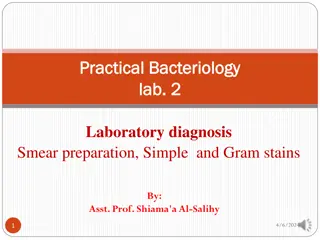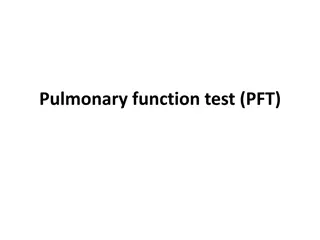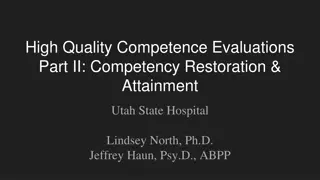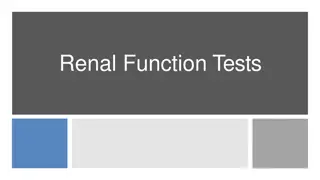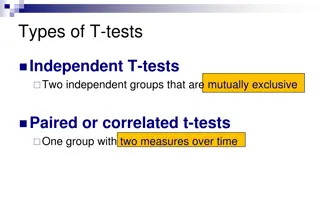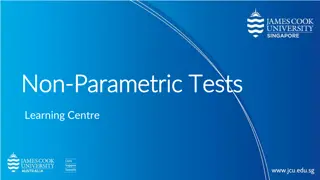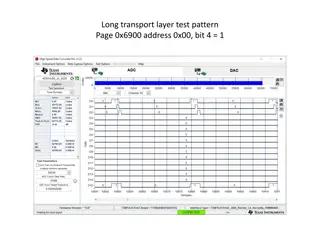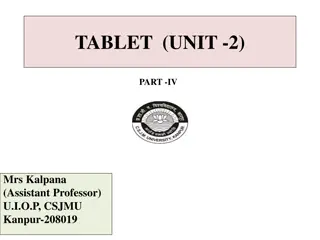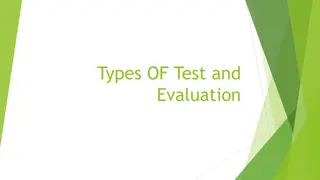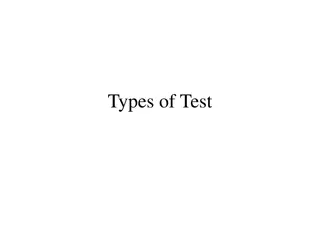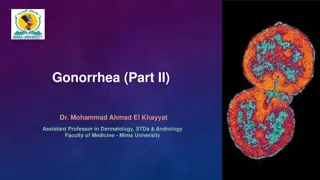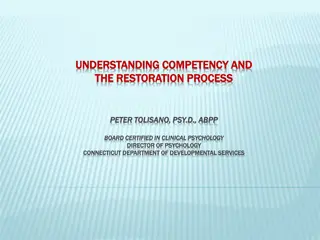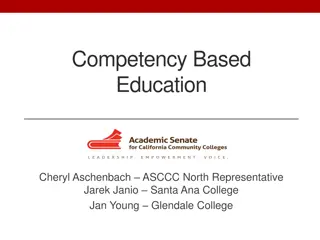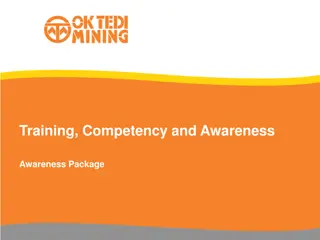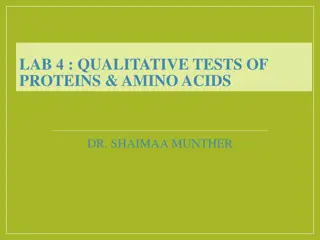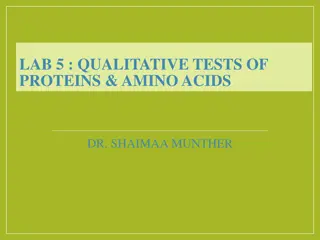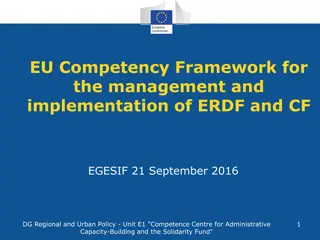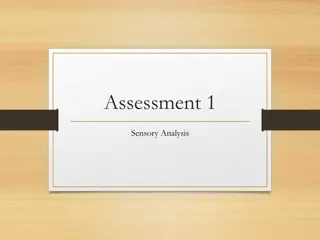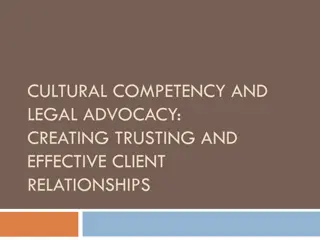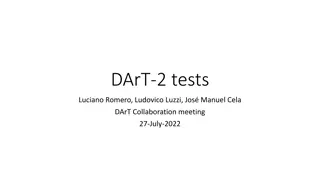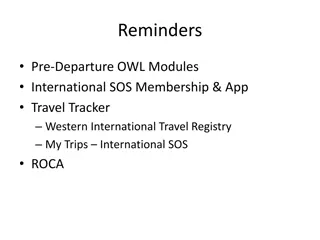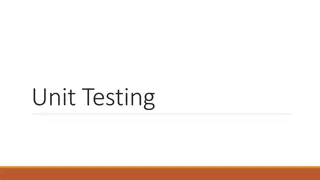Construction of an Achievement Test
Learn about achievement tests, standardized tests, oral tests, essay tests, and more for student evaluation. This guide discusses various types of tests and their purposes in assessing student learning. Enhance your understanding of educational assessment methods with this comprehensive resource
0 views • 29 slides
Digital Competency Maturity Model 2.0 for Accounting Firms - Overview and Implementation
The Digital Competency Maturity Model 2.0 (DCMM 2.0) is a framework designed to help professional accounting firms evaluate and enhance their digital competencies. Released as an upgrade to the previous version in 2017, DCMM 2.0 offers a structured approach for firms to assess their current level of
4 views • 19 slides
Practical Bacteriology Laboratory Diagnosis and Sample Collection
This practical guide focuses on laboratory diagnosis steps in bacteriology, covering specimen collection, microscopic examination, culture tests, biochemical tests, serological tests, and molecular tests. Learn about various sample collection methods for urine, stool, swabs, sputum, pus, CSF, and mo
3 views • 23 slides
Understanding Competency-Based Education in Modern Curricula
Explore the differences between new and old curricula, grasp the concept of theoretical versus competency-based education, and delve into the benefits of competency-based learning. Discover how competency-based education shifts the focus from grades to students' competence in subjects.
4 views • 10 slides
Changes in ITC for 2025: Exam Structure, Competency Framework, and More
Exciting changes are coming to the Initial Test of Competence (ITC) in 2025, including adjustments to the exam structure, mark allocation, number of papers, competency framework, and more. The new competency framework emphasizes six competency areas, with a focus on an even spread over three papers.
18 views • 4 slides
Understanding Bial's & Seliwanoff's Tests in Clinical Chemistry
Bial's and Seliwanoff's tests are chemical tests used to detect the presence of pentoses in a sample, distinguishing them from hexoses. These tests involve specific reactions with reagents to produce distinct color changes based on the type of sugar present. The Bial's test, particularly sensitive t
0 views • 17 slides
M O N I T O R T R A I N I N G F L O R I D A S TAT E W I D E A S S E S S M E N T S
Monitoring and Assessment Overview for Florida's Statewide Assessments (ARDA) in Spring 2023 encompass a range of standardized tests administered across districts to ensure test integrity and validity. Tests include FSA, FAST, NGSSS, and B.E.S.T., covering ELA, Math, and Science for various grade le
0 views • 30 slides
Understanding SOLs: Information for Parents at Lees Corner - Spring 2022
SOLs, or Standards of Learning tests, are standardized assessments in Virginia to measure student mastery of grade-level content. These tests are essential for graduation requirements, school effectiveness evaluation, and meeting both federal and state testing mandates. Students are tested on variou
1 views • 12 slides
Comprehensive Overview of Pulmonary Function Tests (PFTs)
Pulmonary Function Tests (PFTs) are vital for assessing pulmonary gas exchange through ventilation, diffusion, and lung perfusion. These tests include measurements of lung volume, airway patency, gas exchange efficacy, and pulmonary blood flow. PFTs offer benefits in diagnosing dyspnea, monitoring d
0 views • 14 slides
Competency Evaluation Process: A Comprehensive Overview
This document delves into the process of competency evaluations, specifically focusing on competency restoration and attainment at Utah State Hospital. It covers key steps such as petition, order for evaluation, findings of incompetency, competency restoration treatment, and review. It outlines the
0 views • 41 slides
Understanding Verbal and Non-Verbal Tests
Verbal and non-verbal tests serve different purposes in assessing intelligence and skills. Non-verbal tests utilize images and diagrams to measure reasoning abilities without requiring reading or writing. Verbal tests, on the other hand, assess language-based skills through reading, writing, or oral
0 views • 14 slides
Understanding Renal Function Tests and Kidney Health
Renal function tests are essential for diagnosing and monitoring kidney health. These tests assess functions like glomerular filtration, tubular reabsorption, and endocrine functions of the kidneys. Common indicators include serum urea, creatinine levels, and more. It's crucial to evaluate renal fun
0 views • 34 slides
Understanding Different Types of T-Tests in Psychological Research
This article provides an overview of different types of t-tests used in psychological research, including independent t-tests for comparing two groups, paired or correlated t-tests for within-group comparisons, and the assumptions behind conducting these tests. It also includes examples of when to u
1 views • 7 slides
Understanding Non-Parametric Tests and Their Applications
Non-parametric tests serve as valuable alternatives to parametric tests when data do not meet specific criteria. This article explores the concept of non-parametric tests, types of non-parametric tests, and provides insights on conducting the Mann-Whitney U Test using SPSS for practical research app
4 views • 32 slides
Long Transport Layer Test Patterns for Data Evaluation
Explore various test patterns for data evaluation purposes including long transport layer tests, ADC data reverse order tests, 12-0ctet RPAT tests, and D21.5 tests. These patterns involve specific addresses and data configurations that need to be established before usage with TSW14J57EVM. Each patte
0 views • 4 slides
Quality Control Tests for Tablet Production
Quality control tests play a crucial role in ensuring the safety and efficacy of tablet products. This article discusses various parameters like general appearance, size, shape, unique identification markings, organoleptic properties, hardness, friability, weight variation, and content uniformity th
1 views • 11 slides
Understanding Types of Test and Evaluation in Education
Explore the various types of tests used in education, including pre-tests, mastery tests, and diagnostic tests. Learn about different mediums for testing, such as oral, written, and performance tests. Discover the role of examinees in essay-type and objective-type tests. Lastly, delve into different
1 views • 13 slides
Understanding Achievement and Aptitude Tests in Education
Explore the differences between achievement and aptitude tests, such as how they measure abilities and knowledge. Learn about teacher-made tests, standardized tests, low-stake, and high-stake tests. Discover the importance of achievement tests in evaluating present proficiency and aptitude tests in
1 views • 16 slides
Gonorrhea Diagnostic Methods and Tests Overview
Dr. Mohammad Ahmad El Khayyat, an Assistant Professor in Dermatology, STDs, and Andrology, details the diagnostic methods and tests for gonorrhea. Various tests including Gram stain, culture, antigen detection tests, and nucleic acid amplification tests are discussed, highlighting sensitivity and sp
1 views • 30 slides
Understanding Achievement Tests in Education
Achievement tests play a crucial role in assessing student progress in schools, aiding curriculum planning, and evaluating teaching programs. These tests measure individual accomplishments after a period of learning, helping to determine the effectiveness of instruction. Characteristics such as reli
2 views • 30 slides
Understanding Criminal Competency in Legal Proceedings
Competency in criminal cases is crucial for ensuring the accuracy and fairness of legal proceedings. Adjudicative competence, based on standards like the Dusky Standard, relates to a defendant's ability to understand and engage in legal processes. Mistaken beliefs, such as equating clinical disorder
0 views • 12 slides
Integrated Language Tests and Assessments Overview
This content delves into integrated language tests and assessments, exploring the differences between separate skills tests and integrated tests. It covers the rationale behind integrating language skills, examples of integrated skills tests, as well as shortcomings to avoid in test design. Key aspe
1 views • 35 slides
Understanding Competency-Based Education in Practice
Competency-Based Education (CBE) allows students to progress based on mastery of skills rather than seat time. It offers personalized learning, efficient outcomes, and focuses on employer needs. Examples include CTE courses, noncredit pathways, and open entry/exit programs. The approach emphasizes c
0 views • 12 slides
Quality Control Tests for Pharmaceutical Packaging Materials
This article discusses quality control tests for pharmaceutical packaging materials focusing on glass containers. The tests include chemical resistant tests such as powdered glass test and water attack test, as well as hydrolytic resistance tests. Detailed procedures for each test are outlined along
3 views • 18 slides
Comprehensive Training and Competency Program for Mobile Plant and Equipment
This comprehensive program focuses on training, competency, and awareness for mobile plant and equipment within OTML. It emphasizes high standards of safety, health, environment, and competency-based learning to ensure all personnel, including contractors, are appropriately trained. From assessments
0 views • 13 slides
Enhancing Religious and Cultural Literacy for Effective Engagement
Explore the importance of religious literacy and competency in engaging diverse communities during disasters. Learn how to differentiate between literacy and competency, understand the needs of partners, provide culturally appropriate services, and build sustainable relationships. Continuous learnin
0 views • 20 slides
Developing Communicative Competence in English Language Teaching
In English language teaching, the main goal of a communicative classroom is to foster students' communicative competence. This includes grammatical competency, sociocultural competency, discourse competency, and strategic competency. By focusing on these aspects, educators aim to enhance students' a
0 views • 7 slides
Witness Competency Guidelines and Rules in Legal Proceedings
Witness competency in court proceedings is crucial for the administration of justice. Modern views and historical practices shape the rules governing witness competency, covering aspects such as firsthand knowledge, oath requirements, refusal to be cross-examined, and handling of hypnotized witnesse
0 views • 31 slides
Administrative Hearing Professionals: Competency and Evidence Considerations
Explore the key aspects of competency objections and evidence considerations in administrative hearings based on a fact scenario involving an employer, a trucking company, and a terminated driver. Learn about witness competency rules, burden of proof, and evaluation of evidence to make informed ruli
0 views • 19 slides
Qualitative Tests of Proteins & Amino Acids: Overview and Analysis
In this lab, you will delve into the qualitative tests for proteins and amino acids, understanding their structures, classifications, and importance in food and human nutrition. The tests include solubility tests and identification tests for both amino acids and proteins, revealing their presence an
0 views • 13 slides
Qualitative Tests of Proteins & Amino Acids - Lab Analysis Overview
This lab analysis covers qualitative tests for proteins and amino acids, including solubility tests and identification tests for amino acids and proteins. Specific tests like Ninhydrin test for -L amino acids, Xanthoproteic test for aromatic amino acids, and lead sulfite test for sulfhydryl group de
0 views • 13 slides
EU Competency Framework for ERDF/CF Management & Implementation
This EU Competency Framework, developed by DG Regional and Urban Policy, provides a comprehensive approach to assessing competencies for managing and implementing ERDF and CF. It includes self-assessment tools, identifies competency gaps, offers blueprints for training programs, and covers all key i
0 views • 9 slides
Sensory Analysis Tests in Food Evaluation
Explore different sensory analysis tests used in food evaluation, including paired comparison tests for sweetness, quantitative descriptive analysis for taste attributes, and affective tests like hedonic tests. Understand the purpose and methodology of each test to enhance product development and qu
0 views • 12 slides
Cultural Competency and Legal Advocacy: Building Trusting Client Relationships
Understanding cultural competency is essential in legal advocacy to provide effective and trusting client relationships. Cultural competence involves equal access and non-discriminatory practices, enabling communication and intervention for clients from diverse backgrounds. The importance of cultura
0 views • 18 slides
Building Change Competency: Keys to Successful Change Management
Discover the importance of building change competency and the keys to successful change management. Explore why change competency is crucial for organizational success, along with strategies for managing change effectively. Learn about different change management approaches and the benefits of a pro
0 views • 25 slides
DArT-2 Tests and Experiments Overview
The DArT-2 tests involve twin experiments - DArT-2 and DArT-Test, focusing on ensuring the performance of DArT-2 in studying underground argon. Various tests like electronic tests of the PDM and vacuum tests are conducted to guarantee proper operation. Challenges with vacuum sealing and solutions li
0 views • 8 slides
Understanding Intercultural Competency and Cultural Identity
Explore the concept of culture, intercultural competency, and cultural identity through reflections on one's heritage, experiences, values, and beliefs. Learn the importance of developing intercultural competency to communicate effectively across diverse cultures.
0 views • 12 slides
Mastering Competency-Based Interview Questions
Enhance your interview skills by learning how to craft strong responses to competency-based questions using a structured format. Explore tips, strategies, and examples to excel in your next job interview. Utilize tools like Unifrog to prepare and practice for common competency questions effectively.
0 views • 9 slides
Understanding the Differences Between Objective and Projective Tests
Objective tests aim to maximize objectivity by providing structured response options, while projective tests delve into hidden emotions and conflicts through ambiguous stimuli. Pros of objective tests include standardization and reliability, but projective tests offer unique insights based on indivi
0 views • 10 slides
Understanding Unit Testing in Software Engineering
Concept Software is a discipline comprising various code pieces. Testing these codes together is complex but vital in Software Engineering. The process includes early testing like unit tests, pairwise/multiple component testing, module testing, integration testing, user tests, alpha tests, beta test
0 views • 6 slides


